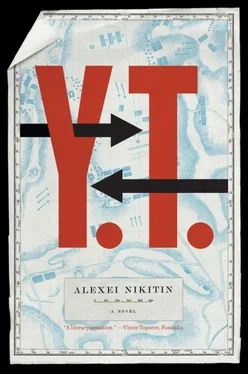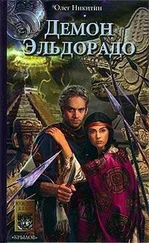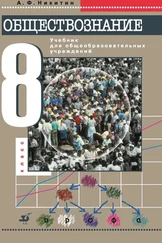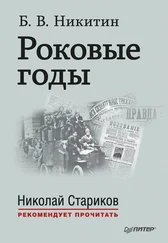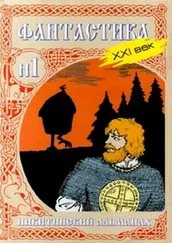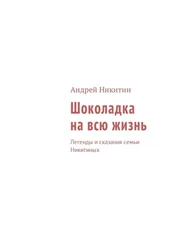Kurochkin curled his lip. ‘At least we know it’s not their president.’
Our people are unswerving and steadfast in their contempt from afar for figures imbued with power, and, despite his previous incarnation as Deputy Premier, Kurochkin was no different. A friend of mine came to visit a few years ago—by that time he’d been living in America for around twenty years—the television was switched on and Clinton was being broadcast live, his cheeks and neck varying in hue from deep beet-red to floury-white and back to ripe beet again. He was giving testimony on his private life, and the whole world, billions of viewers, were appreciating his chameleonesque abilities.
‘Our wonderful president…’ my friend said knowingly and nodded at the television with the grimace of a man who’s bitten into a lemon. At that moment I recalled that in the happy days of pre-Rasputin St. Petersburg the public had referred to the tsar as Our Colonel of Tsarskoe Tselo and probably pulled similar faces and winked. But as soon as such a citizen comes face to face with an important official, then for months afterwards he spouts butter and honey and contorts his spine into a studied faint bow. Even the words he uses change.
‘By the way,’ I said, checking myself abruptly, ‘Did you notice that the letters YT are in the wrong place? They’re not supposed to be in the letter itself.’
‘What do you mean “not supposed to”?’
‘Well, they’re not in the ultimatum, for example. Remember? You could transfer several documents in one move, but YT was used…’
‘That’s right. We put YT only on memoranda that listed all the actions taken in a turn… No,’ he interrupted himself and started laughing, ‘they have done everything correctly. If the entire move consists of this one letter, then there’s no need for a memorandum.’
‘But how do you know this was the last action in the move?’
‘They put YT where they did so that I wouldn’t expect a memorandum or any other documents.’
Once I parked the car on Golden Gate Street we plunged into the March mud and made our way to Rabelais. I was overcome by a sense of unreality, of the impossibility of what was happening.
The person waiting for us in the restaurant was Sinevusov. Almost as soon as Kurochkin had mentioned a surprise, I knew there was something I didn’t like. Now I knew why.
If I hadn’t seen the major again twelve or thirteen years before I wouldn’t have recognized him now. It had been a time of demonstrations and queues. Then we thought it appropriate to divide population into two groups: progressive and forward-thinking people like us who were demonstrating and fighting for our rights and freedoms, and people like them, the backward silent majority , fed at the hand of an inhumane regime, who stood in queues for vodka and liver sausage. Although the demonstrators needed vodka and liver sausage no less than those who learned about the demonstrations from the television news.
It was late autumn and already cold. I had stopped by a tea shop on Kreschatik. These days it bakes and sells incredibly delicious apricot and prune buns straight from the oven, but back then there was nowhere on all of Kreschatik where you could have a hot tea and bun. At the time the shop was offering swill of some sort and petrified-cheese sandwiches. I stood in the queue warming myself and looking around, expecting to see familiar faces. You see familiar faces all over Kiev; the more you look, the more you see. I didn’t notice Sinevusov immediately. The queue was snaking its way between the little tables, and for a while the major was hidden in a bend. I didn’t see him until I was nearly upon him, although I still didn’t recognize him. He had aged noticeably. His cheeks sagged, his face was grey and he had grown out what little hair he had left and gathered it into a ponytail—a dirty-grey ponytail. Before, he had looked youngish and blond—albeit blond with bald patches—and he had considered himself a blond beast.
The major was at the counter chatting with a tall, stout man in an old brown windcheater.
I overheard Sinevusov’s tenor saying, ‘You keep going on and on about Faulkner, Faulkner…’ His voice hadn’t changed. Which is when I realized—no, realized isn’t the word; I felt who he was, and I was badly shaken. ‘Faulkner was a student of Dostoevsky who didn’t finish the course. He was running around Yoknapatawpha in short trousers with a Nobel Prize medal dangling around his neck, but he was still peering out from behind his fingers at Dostoevsky… What? What’s the matter?’
The stout man in the windcheater was muttering something quietly. Obviously he disagreed with Sinevusov.
‘What sources? Forget it. The sources are all the same, trust me. And people don’t have such Karamazovian depths either. The Karamazovs are a fiction—the creation of a brilliant writer, all three of them. What? Well, yes, of course, all four. I was, that is I… Look, they’re demonstrating on the square. Don’t you want to go see? Two hundred meters from here. I’ve had enough of it. Democrats. No one knows them better than me.’ He took a sip of tea. Beads of oil mixed with venom oozed on his brow and upper lip. ‘But, if you will, I’m the number-two democrat in this city. Everyone else was still standing at attention and reporting to the Party Congress as usual, but I—’
At this point the stout man apparently asked about the number-one democrat. Sinevusov named someone I’d never heard of before—the name meant nothing to me.
I didn’t approach Sinevusov then. I had no desire to chew the fat with him about the past. We had no common past.
‘Recognize him?’ asked Kurochkin as we crossed the room to the table. Sinevusov had been waiting a while—we were more than an hour late.
‘Thanks a lot. I’ve been dreaming of this meeting all my life.’
‘Ho-ho!’ He raised his hand and stopped. ‘Don’t get carried away now.’
‘Whatever,’ I said. ‘We don’t fight old men.’
Writing Sinevusov off as an old man was stretching it a little. If he had been around forty back then, he was sixty now. That didn’t exactly make him old. And my major was looking great. He hadn’t cut off the ponytail; on the contrary, he’d let it grow even longer. The ponytail had briskly silvered to a cold bright grey, and the folds and wrinkles on his face created a unified picture. Sinevusov had at last grown into his own face. It wasn’t much, but it was his.
Lunch, or dinner as far as I was concerned, was all business. No one showed any surprise or any particular emotion. No one said, ‘It’s been ages!’ or ‘Hasn’t time flown?’ or any other formulaic nonsense. We shook hands briefly, as if we’d just met the night before. That was all. Only once did I catch Sinevusov appraising me with a brief sideways glance. All evening Sinevusov said nothing. He said nothing and ate. Kurochkin spoke.
It seemed that I no longer knew Kurochkin—or, rather, I’d never got to know the Kurochkin of today. Sometimes you can just tell what kind of an adult a child will become. But back when I knew him well, when we were close, Kurochkin had been different. If you accept that a person is the sum of his experience, back then the Kurochkin of today hadn’t begun to develop. He was the only one of us who managed a fresh start at university after the army. Although ‘all of us’ is misleading. By then we were only three of the original five: Kurochkin, Kanyuka and me. Sashka Korostishevski didn’t come back from Afghanistan, and Mishka Reingarten was spending his third year in room 103 of the Frunze Street Hospital. Mishka had tried to evade the army on the grounds that he was nuts, but the doctors evaluating his case determined he wasn’t just a draft dodger and his ailment really did require urgent treatment. If Mishka was still alive, then they were treating him to this day. I hadn’t seen him for a long time, around ten years.
Читать дальше
